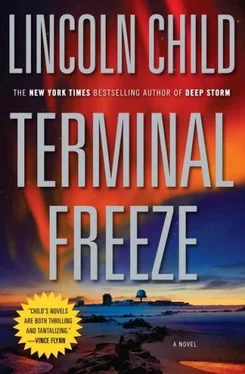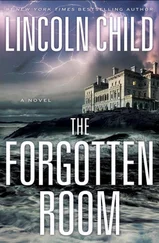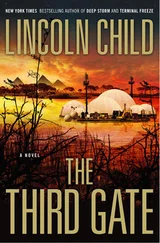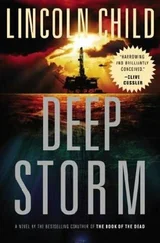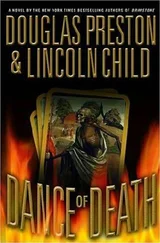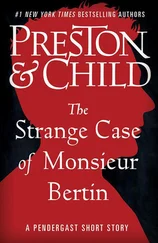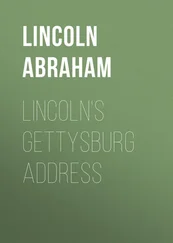“Where are you going?” Wolff asked.
“To the armory. I’ll be needing more firepower.”
“Why?”
“Because I’m going hunting.”
After the door shut behind Gonzalez, Wolff walked over and locked it. He stood a moment in silence, facing the closed door. Then, quite abruptly, he turned and walked to the center of the room. “Well?” he said to nobody in particular.
“I can’t leave.” It was Sully, the climatologist, who spoke. His voice shook slightly. “I’m the expedition leader. I can’t just leave all our experiments here. Besides-Evan’s missing.”
Ekberg started at this. “Missing? But I was just talking to him, not two hours ago.”
Sully nodded grimly. “He hasn’t been seen since. He’s not in his lab. And he’s not in his quarters.”
“He’ll be back,” said Logan.
Everyone turned toward the academician.
“Excuse me?” Sully asked.
“He borrowed the Sno-Cat.”
“In a blizzard?” Ekberg asked. “Where did he go?”
“The Tunit village, to the north.”
“Why?” Sully demanded.
Logan glanced around at his inquisitors. “To get answers. Look, let’s find Faraday and talk about it. In your lab.”
Sully sighed, shook his head. “All right. Once Gonzalez gets back here with the firepower.”
“And when he does get back here, he may have something to say about your little plans.” Wolff glanced around. “The rest of you?”
“Are you kidding?” It was Hulce. “I’m out of here.” There was a murmured chorus of assent from around the room.
Wolff looked at Conti. “Emilio?”
Conti didn’t reply. Since asking about the creature, he had remained silent, his gaze far away.
“Emilio?” Wolff asked again.
As Ekberg watched, Conti became slowly aware he was being addressed. “Excuse me?”
“Can you be ready to leave in half an hour?”
Conti blinked, frowned. “I’m not going anywhere.”
“Didn’t you hear Gonzalez? He’s ordering everyone to head south in Carradine’s truck.”
The producer gave his head a little birdlike shake. “I have a documentary to finish.”
Wolff’s eyes narrowed in disbelief. “Excuse me? There is no more documentary.”
“That’s where you’re wrong.” And Conti smiled faintly, as if at some private joke.
“Emilio, Ashleigh is dead. And in about half an hour, your entire staff will be heading in the direction of Fairbanks.”
“Yes,” Conti murmured. “It’s all up to me now.”
Wolff raised one arm in an exasperated gesture. “Didn’t you hear? You’ve got no crew!”
“I’ll do it myself. The old way, the classic way. Like Georges Méliès, Edwin Porter, Alice Guy Blaché. Fortnum will be leaving with the rest of them; I know he will.” And he glanced toward Ekberg.
Ekberg understood the significance of that glance; understood what he was asking of her. Despite what she had told Marshall in the Operations Center, despite her uncompromising commitment to both Conti and her career, she felt a cold thrust of fear at the mere thought. Nevertheless, she returned his look and-holding his gaze-nodded slowly.
The old shaman gestured to a pile of caribou skins on the far side of the fire. “Sit,” he said.
Marshall, painfully aware that time was of the essence, also understood this encounter-whatever it might produce-could not be hurried. He sat down.
“How did you know I was coming?” he asked.
“In the same manner I knew you were angering the ancient ones. My spirit guide told me.”
The shaman picked up the scatter of items before him, placed them in a small leather pouch, drew the drawstring tight.
“The others-where did they go?”
Usuguk stretched his palm northward. “To our brothers along the sea.”
“Another Tunit camp?” Marshall asked.
Usuguk shook his head. “Inuit. We are the last of our kind.”
“There are no other Tunits?”
“None.”
Marshall looked over the fire at the old shaman. So it’s true, then. “When will they return?”
“Perhaps never. Life is much easier beside the sea. It has been difficult to keep them here since their mothers and fathers died.”
Marshall sat for a moment, collecting his thoughts. It was hard to believe that this sad little encampment was the last vestige of an entire Native American tribe. It was galling to think that his own arrival at the glacier might be partly responsible for scattering it, even temporarily.
“Those markings you made, outside the base,” he said at last. “What were they for?”
“A warding of protection. To compel the kurrshuq to spare you.” The shaman returned Marshall ’s gaze. “Your presence here means the warding was unsuccessful.”
Marshall hesitated again. He had come all this way, yet he did not know exactly how to begin-or even what to ask. He took a deep breath. “Listen, Usuguk. I know we have already caused you anxiety and difficulty, and I am very sorry for that. It was never our intent.”
The Tunit said nothing.
“Now we are in trouble. Serious, serious trouble. And I have come here in hopes that you can help.”
Still, Usuguk did not reply. His expression was stolid, almost taciturn.
“The mountain,” Marshall continued. “The one you told us was evil. We found something there, as we were doing our experiments. A creature bigger than a polar bear, encased in ice. We…we cut it from the ice. Now it’s missing.”
As Marshall said this, the shaman’s expression changed. A look of something close to shock blossomed over the weathered features.
“We don’t know exactly what it is. I can only tell you that it has caused injury. It has caused death.”
The look of shock subsided, replaced by the same mix of fear and sorrow Marshall recalled from their first meeting. “Why do you come to me?” the Tunit asked.
“There was a scientific expedition at the base, fifty years ago. It met with tragedy. Most of the scientists died. But we recovered one of their journals. It contained the following words: ‘The Tunits have the answer.’”
Usuguk sat motionless, staring into the fire. Marshall waited, uncertain whether to speak or keep silent. After about a minute, the shaman reached over, rummaged slowly through an assortment of ritual objects, and grasped the bone handle of what appeared to be some kind of drum: a narrow hoop about a foot in diameter, leather stretched tightly across it. Slowly he began tapping it against the palm of his other hand, flipping the instrument with each beat, back and forth, back and forth. He accompanied the rhythm with a chant, quiet at first, then louder, the sound filling the snowhouse like the smoke of the fire. At last, after several minutes, the chant subsided. The shaman’s face was once more at peace. Putting the drum aside, he unstrung the leather pouch, dipped in his hand, and took out two greasy pellets of a soft material, one blue, the other red. He carefully dropped them into the fire, one after the other. Bi-colored smoke roiled upward, blending to violet at its edges.
“Tashayat kompok,” he murmured, examining the smoke. “As you will it.” Marshall did not think the shaman was speaking to him.
Marshall repressed the urge to glance at his watch. “Do you know what the scientist meant?” he asked. “About the Tunits having the answer?”
Usuguk said nothing. His eyes remained on the fire.
“I know you’ve seen something of the world,” Marshall went on. “Your command of English says as much. If you can help, if you know anything about this, please tell me.”
“It is not my place. You have brought this darkness upon yourself. I’ve already done what I could. I made a long journey-a sun, a moon, and a sun-to warn you. You paid no heed.”
Читать дальше
